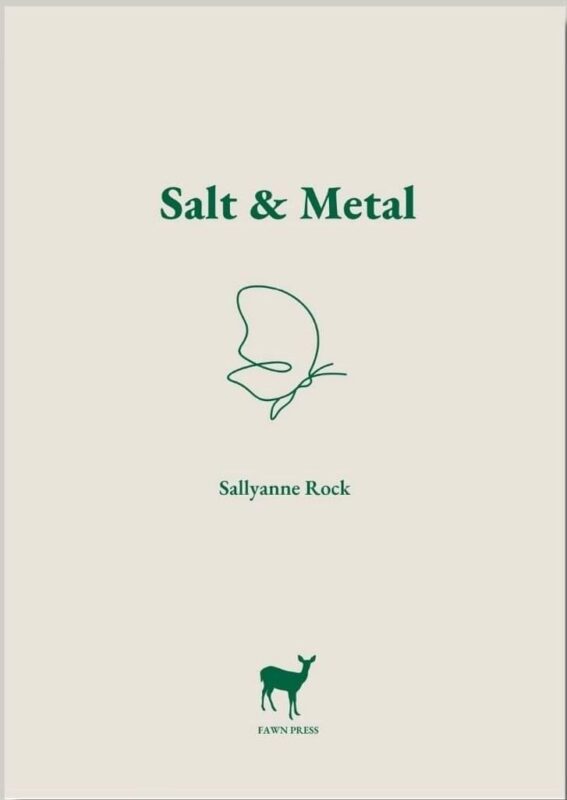REVIEW: SALLYANNE ROCK’S ‘SALT & METAL’
Reviewed by Stella Backhouse

Taken from the website of Women’s Aid, the UK charity working to end domestic abuse against women and children: “There are no reliable prevalence data on domestic abuse but the Crime Survey of England and Wales offers the best data available…For the year ending March 2020, an estimated 1.6 million women aged 16 to 74 years experienced domestic abuse…The large majority of defendants in domestic abuse-related prosecutions in the year ending March 2020 were recorded as male (92%) and the majority of the victims recorded as female (77%).”
These are the unvarnished statistics. But let’s take a closer look – because hidden behind every one of them lies not just a heartbreaking story of real-life tragedy, but also, on the victims’ part, a toxic mixture of fear, shame and silencing that is the very reason these experiences remain out of sight in the first place. Sallyanne Rock’s brave new pamphlet Salt & Metal breaks this cycle. By taking us inside an abused woman’s mind, she exposes the mechanisms used by perpetrators to strip away victims’ identity, cancel their self-confidence, control their every move and – on top of all that – leave them believing it’s all their own fault.
Although short, this collection does contain an identifiable narrative arc. In the opening poem, the woman symbolically moves away from the Security Desk at Charles de Gaulle Airport for what is presumably a holiday with her partner/abuser. What might seem to an outsider to be a time for relaxation is actually an opportunity for abuse to take place away from the potentially intrusive gaze of friends and family. There is a sense both of removal to a foreign country where ‘normal’ rules do not apply and of brainwashing the woman into believing that the tyranny she is subjected to is actually pleasurable: “enjoy the momentary feeling of weightlessness/as your heels leave the carpet./Note in particular the exquisite density of the armoire/as it collides with your back.”
And yet this is no foreign country. The torture chamber is a suburban home, the lethal weapons are familiar domestic artefacts like an iron’s electric flex. Along with the insidious drip-drip nature of abuse – the “gentle lessening; one mandolin-thin sliver each day” – and the abuser’s conceptualisation of woman as a purely mechanical entity, like a car that his task is to ‘fix’, it is this topsy-turvy “War is peace, freedom is slavery, ignorance is strength” clash of realities that is the major instrument of control.
Even as he abuses, the abuser offers meagre, contestable proofs of love (“Help yourself to cake/while you perform the cauterisation./ Save me the piece with the most icing” – imagine him later accusing her of being greedy or too fat) so that in the public arena he can paint himself as the victim by “ask[ing]/you in front of his friends why you are so/miserable all the time. He will look at them and laugh and/say after everything I have given her.” This warping of normality also impacts the woman’s own psyche. The collection does not shy away from acknowledging a normality that has twisted into one of wishing the abuser dead: “I want you to be driving/and get hit from behind by an articulated lorry/for the force to lift your wheels from the road/ like a body pushed across a bedroom.”
‘Means of Escape’, based on ‘The Red Wheelbarrow’ by William Carlos Williams, demonstrates how poetry can stand alongside documentary/reportage as a valid means of capturing the experience of abuse. Rock takes the hyperreal but unstable present of Williams’ poem and transfers it to a snatched, high-stakes opportunity to escape. Words like “narrow”, “waiting”, “cobweb” and “depending” intensify the panic of breaking cover, of standing alone in a moment hanging by a thread, with an uncertain phone call from a nameless ‘she’ the only plan for reaching safety.
Because the scars of abuse – mental and physical – never fully heal, the final poems should perhaps be described as ‘hopeful’ rather than ‘happy’; but the message that release is possible is an important one. These are stripped back, accessible poems (which does not mean ‘simple’) – and that’s exactly as it should be; because this is a collection that urgently needs to be understood.
Salt & Metal is available online from new indie publisher Fawn Press (founded in 2021). Women affected by domestic abuse in the UK can seek help from the charity Women’s Aid. Readers in Coventry can also access Coventry Haven Women’s Aid.
